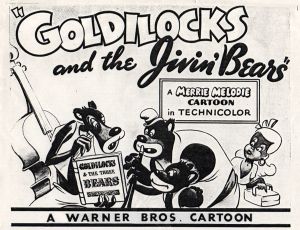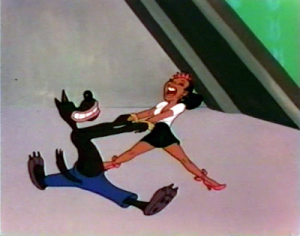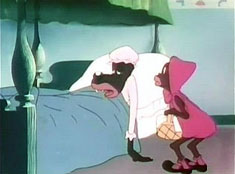Goldilocks and the Jivin' Bears
Goldilocks and the Jivin' Bears is a Warner Bros Merrie Melodies cartoon directed by Friz Freleng back in 1944. The short was released on September 2, 1944.[1]
Because of the racial stereotypes of black people, this cartoon withheld from the syndication by United Artists back in 1968. Hence, this short grouped under the so-called "Censored Eleven". The characters captured in this cartoon are not as problematic as any other cartoons in the famous Censored Eleven. To be fair this cartoon is quite enjoyable and the plot also entertaining despite the racial issue among the characters.
Plot
This is the story of Goldilocks and three bears, who are jazz musicians mixed with Little Red Riding Hood and Big Bad Wolf. African American bears in this short are not a family but three male bears of different sizes living in the same house (the king size bear, the tall middle bear, and the little bear) hold a Jazz jam session. When their instruments get a little hot because of the jam sessions, they decided to take a walk while let the instruments cooling down.
Meanwhile in grandma house a Big Bad Wolf already dressed disguise as grandma and waiting for Little Red Riding Hood but the Red Riding Hood was late to visit the grandma house because she is "working at Lockheed as a rivetater". Frustated Big Bad Wolf looking out the window and see Goldilocks enters three bears' house. Unlike the other characters, Goldilocks is drawn as an attractive young woman. Big Bad Wolf decides to pursue Goldilocks because of hunger and frustration.
The wolf chases Goldilocks through the house until the Three Bears return. Finding Goldilocks and the wolf struggling in the living room, they shout "Jitterbugs!" and begin playing a dance tune. The wolf and Goldilocks dance the jitterbug until the wolf is exhausted and defeated flees to Grandma's house.
Red Riding Hood returns to find the wolf in Grandma's bed, but the wolf is too tired to eat her. So he attempts to make Red Riding Hood leave, by telling she came too late for their segment and his feet are sore because of dancing. However The Three Bears rush in, shout "Dere's dat jitterbug!" and resume playing. This causes Grandma to burst out of a cupboard and jitterbug with the wolf.[2]
The Controversy
The big lips of the bears, the wolf, and the messenger provided visual ethnic stereotype that largely avoided by 1968. The tall bear and the messenger have the sleepy half-closed eyes and big lips that resemble the demeanor of lazy characters played by actor Stepin Fetchit, whose prime had long passed by 1944 and certainly by 1968. Also, multiple characters speak in ethnic dialect, and even a letter from Red’s grandmother has the written malapropism “rivetater.” With the placement of Goldilocks on the censored list, the wolf’s dancing finally stopped.[3]
Review
The cartoon with the least amount of objectionable content in it. This is probably the most palatable of the eleven, but it’s also the most okay. It’s got some good music, and some decent gags, but nothing that you can’t see in other cartoons; there’s not really anything here to help push this beyond anything other than standard. This isn’t a bad short at all, since it is enjoyable and a pleasant watch, and it doesn’t really do anything that wrong.[4]
External Link
Watch Goldilocks and the Jivin' Bears at Dailymotion
Goldilocks and the Jivin' Bears at IMDb
References
- ↑ Goldilocks and the Jivin' Bears. Retrieved December 20, 2020
- ↑ Big Cartoon Database. Retrieved December 20, 2020
- ↑ Cartoon Research. Retrieved December 20, 2020.
- ↑ jsrrayburn1, June 23, 2019. Goldilocks and the Jivin' Bears review. Retrieved December 20, 2020


